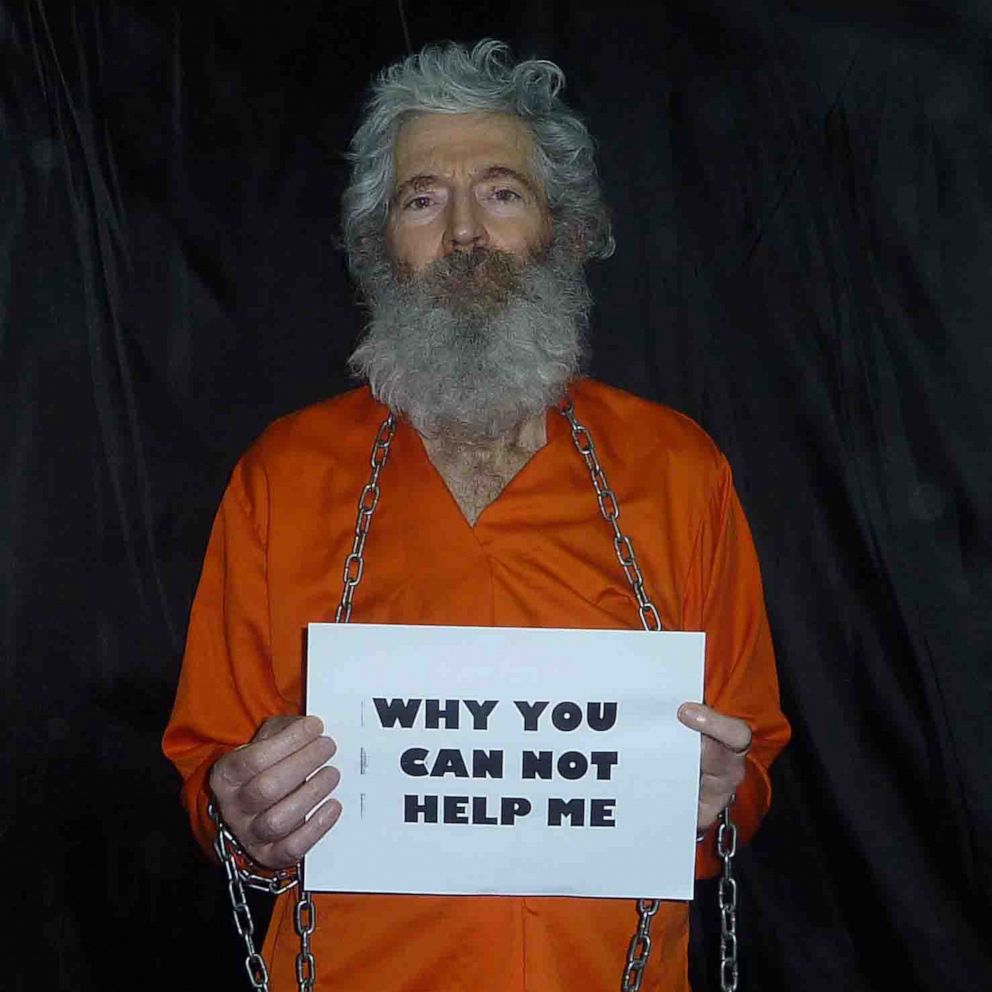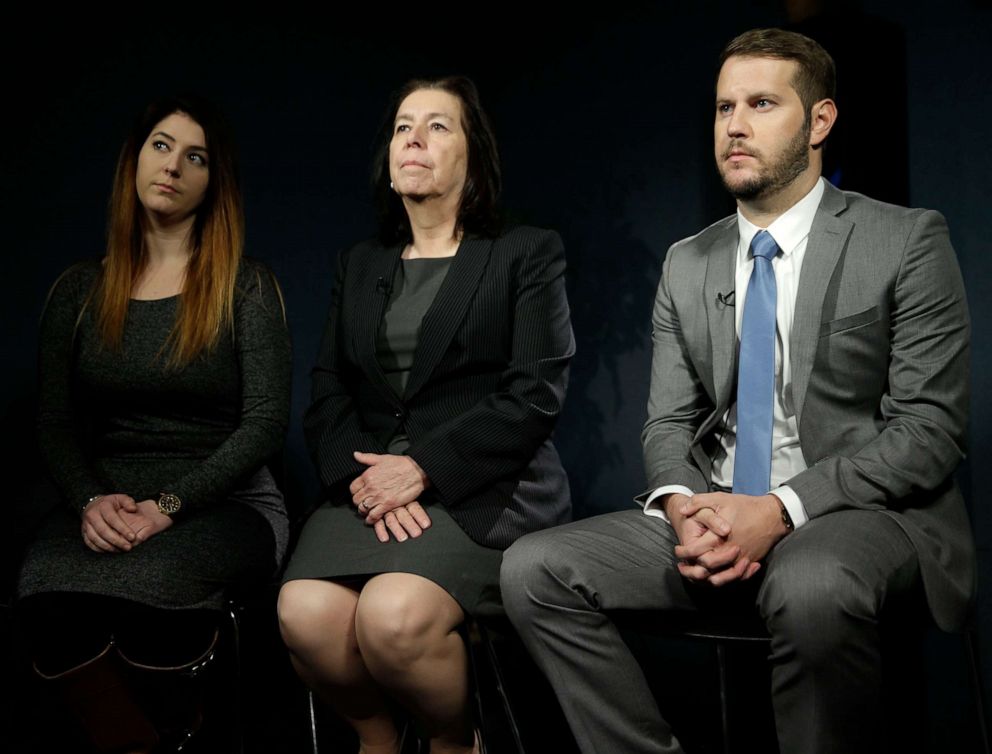No body, no burial, no peace for Iran hostage Bob Levinson's family
The former FBI agent disappeared on Iran's Kish Island 14 years ago this week.
This week marked 14 years since retired FBI Special Agent Bob Levinson vanished almost without a trace on Iran's Kish Island, and one year since his family finally accepted U.S. assessments that he died in captivity -- but they still haven't been able to adequately say goodbye to the beloved husband, father and grandfather.
"We haven't been able to hold a funeral for my dad," Levinson's daughter, Sarah Moriarty, told ABC News.
The family of Bob Levinson has nothing to bury.
Tehran still hasn't acknowledged detaining Levinson, who was working a murky contract for CIA analysts, or that he died at their government's hands.
As a result, the whereabouts of his remains are as much a mystery as the timing and circumstances of his death, which was assessed by the U.S. intelligence community in large part because of the duration of his disappearance, his diabetes, his age -- he would have turned 73 on Wednesday -- and because the only video released by his unknown captors came early in his ordeal.
"We were never given the chance to say goodbye. To touch him one more time and tell him we love him. To bury him and properly grieve -- to have real closure and finality," Sarah Moriarty told ABC News in an interview on his birthday. "After all the Iranians did to us and to him, they owe that to us. We just want to learn the truth of what happened to him, and to say goodbye."
There are other hostage cases that the Biden administration is now focusing on in order to avoid outcomes like the Levinson case -- an effort that's being led by Roger Carstens, the U.S. Special Presidential Envoy for Hostage Affairs, who is a holdover from the Trump administration. Because of the Robert Levinson Act signed into law by President Donald Trump in December, Carstens' position now carries the rank of ambassador and has reach into cases not just of terrorist kidnappings but also of unlawful detainees of regimes.
The families of detainees have welcomed the development.
Of gravest concern is the fate of American Christian humanitarian aid worker Jeffery Woodke, kidnapped in Niger in 2016 by Islamist militants, and of civil engineering contractor Mark Frerichs, kidnapped 13 months ago in Afghanistan and believed to be held by a faction of the Taliban, according to U.S. officials. Carstens has also met with Assad regime officials in Damascus about American journalist and former Marine Austin Tice, who vanished while reporting in Syria in 2012.
But the Levinson case highlights a little-discussed aspect of America's long struggle with citizens kidnapped overseas by terrorist groups and unfriendly regimes: the pain of never being able to lay a loved one to rest or fully accept a death because their body was never recovered or returned.

It is very rare for a hostage who perishes in captivity to be recovered unless they die in an attempted rescue mission, such as missionary Martin Burnham, who was killed in the Philippines in 2002, and journalist Luke Somers, who was killed by al Qaeda as U.S. Navy SEALs tried to rescue him in Yemen in 2014.
Efforts to recover dead hostages' remains, sometimes driven by intelligence, are often disjointed and sporadic. Last year, the remains of a U.S. hostage of the Iran-backed Houthi rebels in Yemen were recovered along with two living American captives who were freed there.
None of the American hostages in Syria or Iraq were ever recovered after they were killed in ISIS captivity in 2014-2015, including American journalists James Foley and Steven Sotloff and humanitarian aid workers Peter Kassig and Kayla Mueller.
Intelligence led FBI agents and U.S. Special Forces to excavate sites in Syria in 2018 in a search for Mueller's remains -- but DNA testing by the FBI Lab at Quantico, Virginia, did not match any of the bones they found to any known Western hostage.
"I continue to say that what matters most is to, God willing, find Kayla, find out what truly happened to her and bring her home where she should be," her mother, Marsha Mueller of Prescott, Arizona, told ABC News on Wednesday. "There is so much we do not know, but we will never give up and we have been blessed with the support of [former FBI counterterrorism agent] Ali Soufan, his team, and so many others."
Margaux Ewen, executive director of the James W. Foley Legacy Foundation, created by the family of the freelance journalist to advocate for the release of Americans held hostage abroad and promote safety of journalists worldwide, said it's important to have the government's support in bringing loved ones' remains home "as part of the overall process for achieving accountability for hostage-taking."
"Recovering the remains of a loved one who was murdered or who died in captivity is a critical component of the healing process," Ewen said.
Another important milestone in the Levinson case was a semantic change in how his vanishing was publicly characterized by the U.S. government. President Barack Obama had described Levinson as "missing in Iran," which angered members of his family. But Trump Secretary of State Mike Pompeo was the first to say Levinson was "abducted," which Joe Biden's Secretary of State, Tony Blinken, also adopted in a statement Tuesday following a phone call to Levinson's family.

Blinken also said the "case is not closed" and pledged to continue pressing Tehran for a resolution.
Another of Levinson's daughters, Samantha Bowman, is now pregnant with Levinson's grandchild, and told Blinken during the call that Levinson won't have a grave where she can bring her child to visit.
"I cry about how we will be able to 'visit' my dad on holidays. We are able to leave American flags on my husband's father's grave, and I wish for my children to have that tangible connection," Bowman wrote on her Facebook page.
"It's just something where you can feel you are with the person," her sister Sarah said in the ABC News interview.
After years of pressing the Bush, Obama and Trump administrations to bring Levinson home alive, the family finally accepted once-controversial government assessments that he died in captivity, which for years were based solely on circumstantial evidence such as his age and health rather than intelligence. His case was even shelved by both Obama negotiators and their Iranian counterparts when they hammered out the Iran nuclear deal in 2016, which freed a handful of other Americans held by the regime.
Iranian military documents authenticated and translated for ABC News by former Bush Pentagon policy director for Iran Ladan Archin in 2019 answered the question of who had arrested Levinson on Kish Island in 2007.
But his family didn't accept the grim assessments of his death until a previously undisclosed private White House meeting a year ago between the Levinsons, FBI Director Chris Wray, then-CIA Director Gina Haspel, then-Acting Director of National Intelligence Ric Grenell and Trump National Security Advisor Robert O'Brien, sources close to the family and U.S. officials told ABC News this week.
Asked by the family what percentage of certainty there was that Levinson had died as an Iranian detainee, officials told the family that there was zero doubt -- and that the time had come for them to accept that he was gone, one person familiar with the private meeting said.
Wray hinted at the meeting in a memo to FBI employees a year ago, but didn't name the other top intelligence officials who accompanied him.
"When I met with the Levinson family, we explained that the most credible evidence we have collected over the past 13 years points to the likelihood that Bob died in captivity. It pained me to deliver that news, but I believe that we owed Bob's family a thorough and candid presentation of the information that we've collected," Wray's memo stated.
Wray added that nobody was closing the books on the case and said his agents would continue to "work doggedly" on finding answers.
"We won't give up, because we don't give up on family, and Bob, his wife Christine, and all of their children will always be part of our FBI family," Wray wrote.




